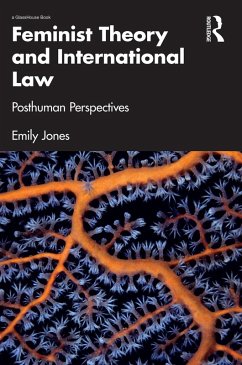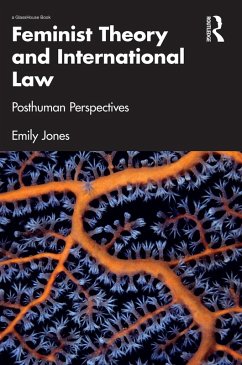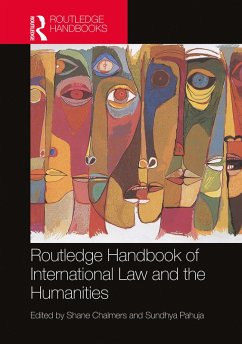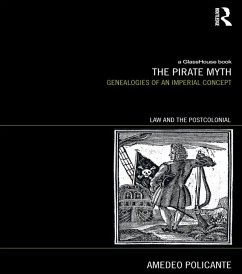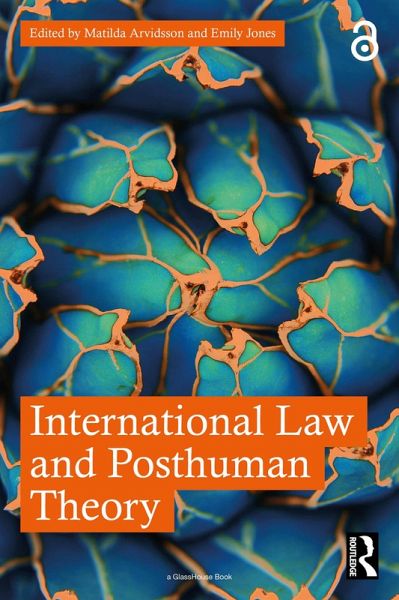
International Law and Posthuman Theory (eBook, ePUB)
Versandkostenfrei!
Sofort per Download lieferbar
37,95 €
inkl. MwSt.
Weitere Ausgaben:

PAYBACK Punkte
19 °P sammeln!
Assembling a series of voices from across the field, this book demonstrates how posthuman theory can be employed to better understand and tackle some of the challenges faced by contemporary international law.With the vast environmental devastation being caused by climate change, the increasing use of artificial intelligence by international legal actors and the need for international law to face up to its colonial past, international law needs to change. But in regulating and preserving a stable global order in which states act as its main subjects, the traditional sources of international law...
Assembling a series of voices from across the field, this book demonstrates how posthuman theory can be employed to better understand and tackle some of the challenges faced by contemporary international law.
With the vast environmental devastation being caused by climate change, the increasing use of artificial intelligence by international legal actors and the need for international law to face up to its colonial past, international law needs to change. But in regulating and preserving a stable global order in which states act as its main subjects, the traditional sources of international law - international legal statutes, customary international law, historical precedents and general principles of law - create a framework that slows down its capacity to act on contemporary challenges, and to imagine futures yet to come. In response, this collection maintains that posthuman theory can be used to better address the challenges faced by contemporary international law. Covering a wide array of contemporary topics - including environmental law, the law of the sea, colonialism, human rights, conflict and the impact of science and technology - it is the first book to bring new and emerging research on posthuman theory and international law together into one volume.
This book's posthuman engagement with central international legal debates, prefaced by the leading scholar in the field of posthuman theory, provides a perfect resource for students and scholars in international law, as well as critical and socio-legal theorists and others with interests in posthuman thought, technology, colonialism and ecology.
Chapters 1, 9 and 11 of this book is freely available as a downloadable Open Access PDF at http://www.taylorfrancis.com under a Creative Commons Attribution-Non Commercial-No Derivatives (CC-BY-NC-ND) 4.0 license.
With the vast environmental devastation being caused by climate change, the increasing use of artificial intelligence by international legal actors and the need for international law to face up to its colonial past, international law needs to change. But in regulating and preserving a stable global order in which states act as its main subjects, the traditional sources of international law - international legal statutes, customary international law, historical precedents and general principles of law - create a framework that slows down its capacity to act on contemporary challenges, and to imagine futures yet to come. In response, this collection maintains that posthuman theory can be used to better address the challenges faced by contemporary international law. Covering a wide array of contemporary topics - including environmental law, the law of the sea, colonialism, human rights, conflict and the impact of science and technology - it is the first book to bring new and emerging research on posthuman theory and international law together into one volume.
This book's posthuman engagement with central international legal debates, prefaced by the leading scholar in the field of posthuman theory, provides a perfect resource for students and scholars in international law, as well as critical and socio-legal theorists and others with interests in posthuman thought, technology, colonialism and ecology.
Chapters 1, 9 and 11 of this book is freely available as a downloadable Open Access PDF at http://www.taylorfrancis.com under a Creative Commons Attribution-Non Commercial-No Derivatives (CC-BY-NC-ND) 4.0 license.
Dieser Download kann aus rechtlichen Gründen nur mit Rechnungsadresse in A, B, BG, CY, CZ, D, DK, EW, E, FIN, F, GR, HR, H, IRL, I, LT, L, LR, M, NL, PL, P, R, S, SLO, SK ausgeliefert werden.






